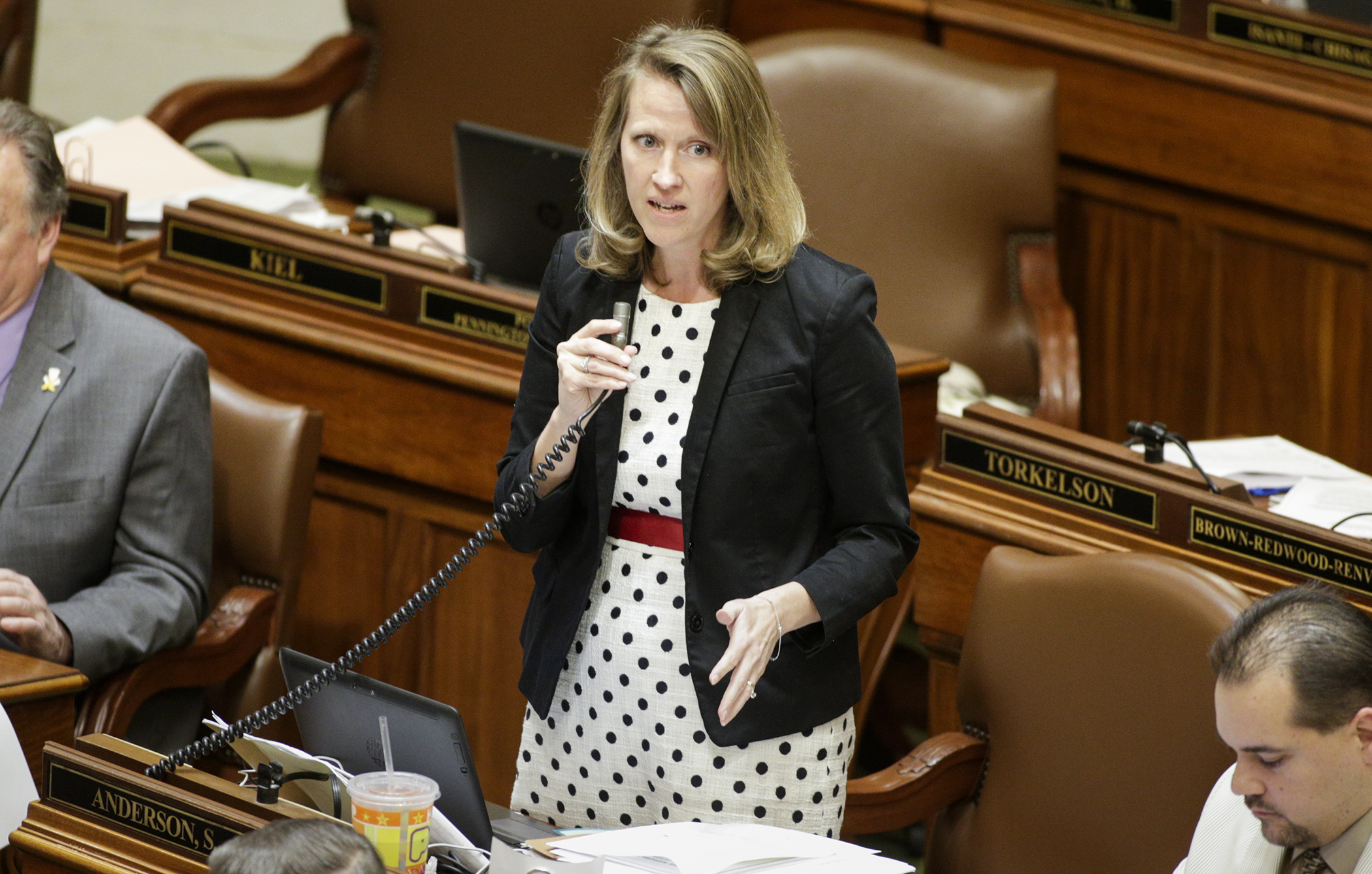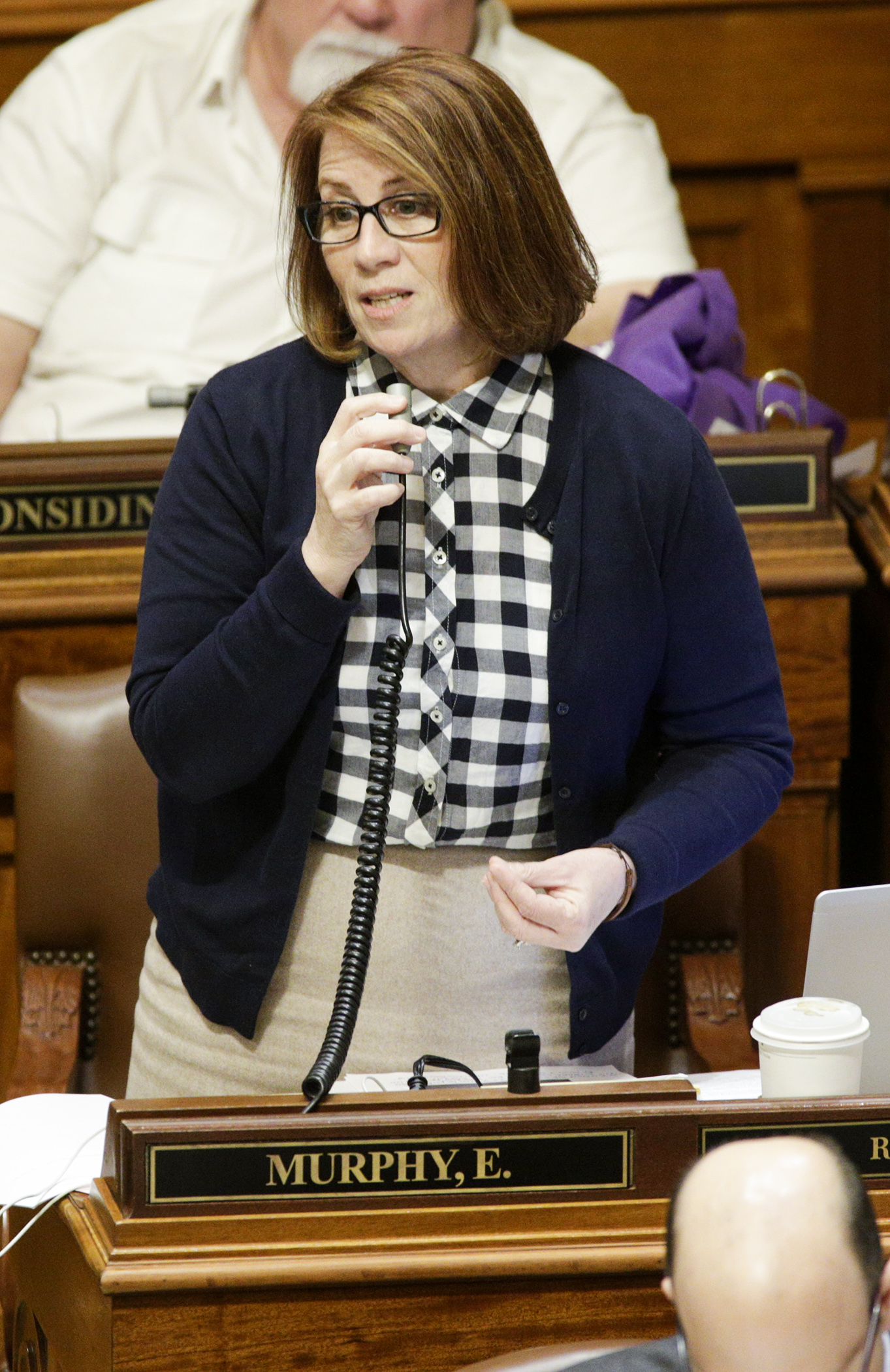House OKs omnibus state government finance bill that reduces spending

A two-year, $944 million plan to fund state government agencies and offices passed the House 75-55 early Friday. Supporters say it would help prioritize core government functions while opponents contend the cuts are too deep.
Sponsored by Rep. Sarah Anderson (R-Plymouth), HF691/SF605*, as amended by the House Ways and Means Committee to include House language, heads back to the Senate where Sen. Mary Kiffmeyer (R-Big Lake) is the sponsor. The bill was passed by that body 36-30 March 29.
“Overall, we’re trying to get our hands around government growth,” Anderson said at a Thursday news conference. “And so we’re capping the growth of government to make it lean, smart and efficient for the taxpayers of Minnesota.”
The House proposal calls for a $430 million spending reduction.
Political ideologies clashed during the five-plus hour debate, as they have since Anderson released her budget plan. At a time when the state has a projected $1.65 billion surplus, thanks, in part, to increases in tax collections, Republicans want to streamline state spending and return money back to taxpayers. DFLers, however, see the windfall as a way to expand education programs and focus on transportation.
“It entails a major slashing and undisciplined approach to dealing with the administrative agencies, the state government agencies, that oversee the state of Minnesota,” Rep. Sheldon Johnson (DFL-St. Paul) said during a morning news conference. “It does harm not only to the agencies themselves, and the employees of those agencies, but also to the citizens of Minnesota who expect good services.”
WATCH The omnibus state government finance bill is presented on the House Floor
Johnson said one of his biggest concerns in the bill is that it doesn’t fund Dayton’s cybersecurity upgrades, but instead only provides “lip service.”
“Minnesota’s citizens remain at risk for personal data, and businesses remain at risk for cybercrime and cybertheft. That’s a big problem,” Johnson said.
Included in the omnibus state government finance bill are provisions that would:
- provide “lights on” funding at 95 percent of current levels, in case a budget isn’t in place before July 1 of an odd-numbered year;
- require Minnesota Management and Budget to reduce executive agencies’ and constitutional offices’ spending by $4.3 million, likely resulting in employment reduction;
- further consolidates the state’s centralized IT service agency, MN.IT, including a $3 million staffing reduction;
- put the Legislature in charge of redistricting;
- allow state employees with other insurance options to opt-out of state insurance plans;
- require political committees that sell goods, like doughnuts, to disclose their affiliation;
- eliminate the Campaign Finance and Public Disclosure Board’s public subsidy program, an estimated $2.67 million savings over the biennium;
- and establish a nonpartisan Legislative Budget Office that would cost $1.68 million in the biennium – an expected $800,000 expenditure per year.
Spending on veterans
Anderson said the budget “prioritizes our veterans.”
“We heard from constituents and citizens across the state of Minnesota concerned about housing for veterans once they’ve returned home from active duty,” she said.
Anderson successfully offered an amendment increasing a one-time appropriation for the Veterans Journey Home, along with directing the Department of Veterans Affairs to maximize federal reimbursement opportunities. Nothing in the bill specifically outlines a bonding proposal for Greater Minnesota communities hoping to build an additional veterans home but gives the department latitude on how to spend funding on its veterans homes.
 Rep. Erin Murphy speaks on her amendment to the omnibus state government finance bill during House Floor debate April 6. Photo by Paul Battaglia
Rep. Erin Murphy speaks on her amendment to the omnibus state government finance bill during House Floor debate April 6. Photo by Paul BattagliaThe bill would fund the Veterans Defense Project, a grant program to educate law enforcement and court officials, and advocate and provide legal assistance for veterans in the criminal justice system. It would also expand the Minnesota GI bill for postsecondary education.
While the state’s veterans are buried at no cost to families, their loved ones still have to choose for themselves between a $745 burial fee in state cemeteries or a free burial at Fort Snelling National Cemetery. A provision in the bill would reduce those fees.
‘Cleaning up’
Additional changes included in the package would “clean up” policies Anderson said are costing Minnesotans too much money.
Rep. Jim Nash (R-Waconia) said an employee gainsharing program has cost the state $7.6 million, while an MMB employee testified during committee that it cost $4.7 million since 2014. A provision in the omnibus bill would put additional oversight on that process.
“As taxpayers, we should all be very, very concerned when, in my opinion, this sort of abuse we see here is going on,” Nash said.
The bill also targets State Auditor Rebecca Otto’s office, which is suing three counties for using outside auditors to look over their books. The lawsuit has cost the state $251,788 and the bill requires Otto’s office to use its appropriations to cover the expense, along with eliminating one of its special enterprise fund.
By a 91-38 vote, Anderson successfully introduced an amendment giving the Office of the Legislative Auditor the authority to assess county audits.
The package also curbs severance packages “so it’s not going out to cronies,” Anderson said, by reducing the amount of money that can go out to public employees.
Related Articles
Search Session Daily
Advanced Search OptionsPriority Dailies
Ways and Means Committee OKs proposed $512 million supplemental budget on party-line vote
By Mike Cook Meeting more needs or fiscal irresponsibility is one way to sum up the differences among the two parties on a supplemental spending package a year after a $72 billion state budg...
Meeting more needs or fiscal irresponsibility is one way to sum up the differences among the two parties on a supplemental spending package a year after a $72 billion state budg...
Minnesota’s projected budget surplus balloons to $3.7 billion, but fiscal pressure still looms
By Rob Hubbard Just as Minnesota has experienced a warmer winter than usual, so has the state’s budget outlook warmed over the past few months.
On Thursday, Minnesota Management and Budget...
Just as Minnesota has experienced a warmer winter than usual, so has the state’s budget outlook warmed over the past few months.
On Thursday, Minnesota Management and Budget...